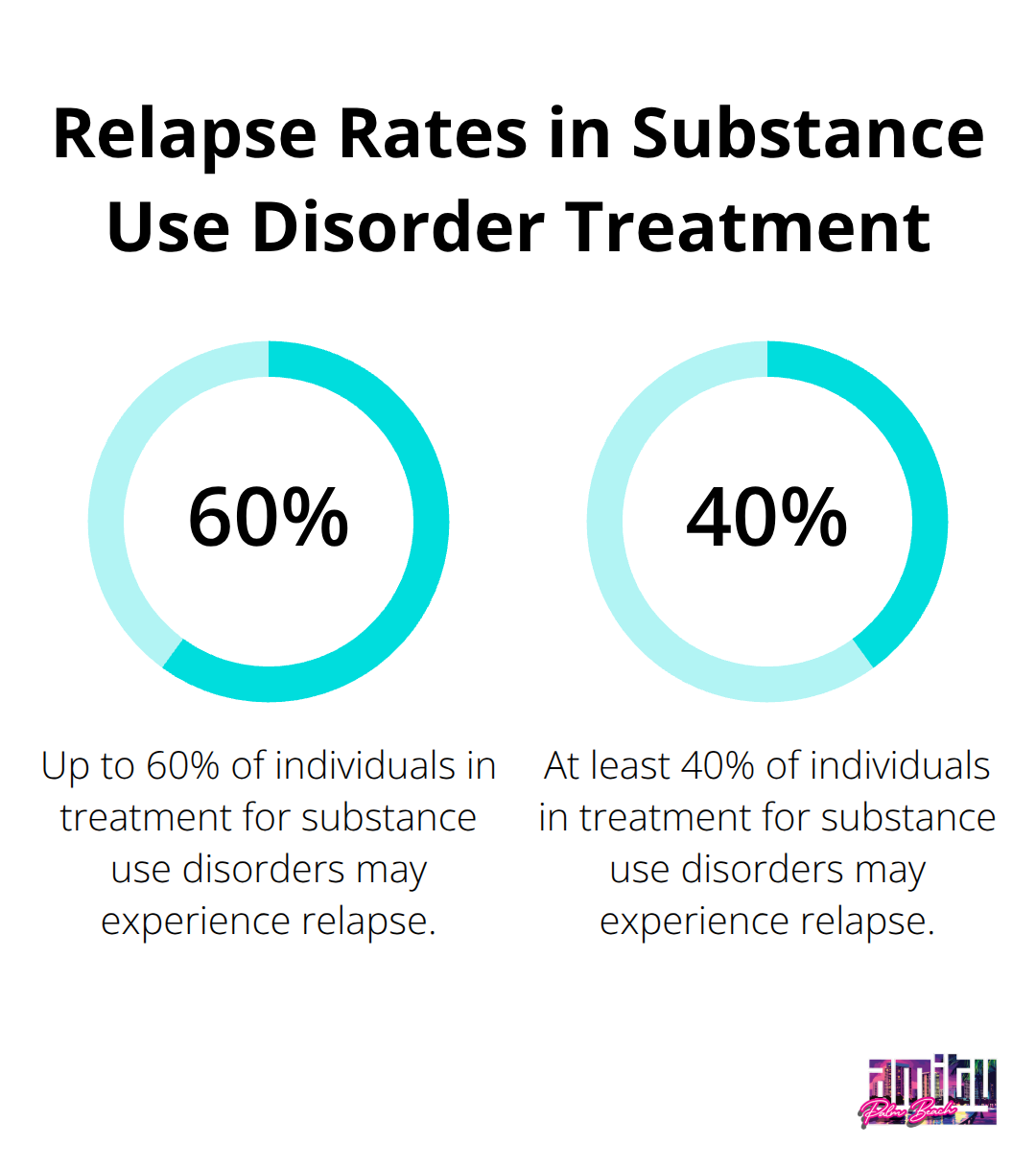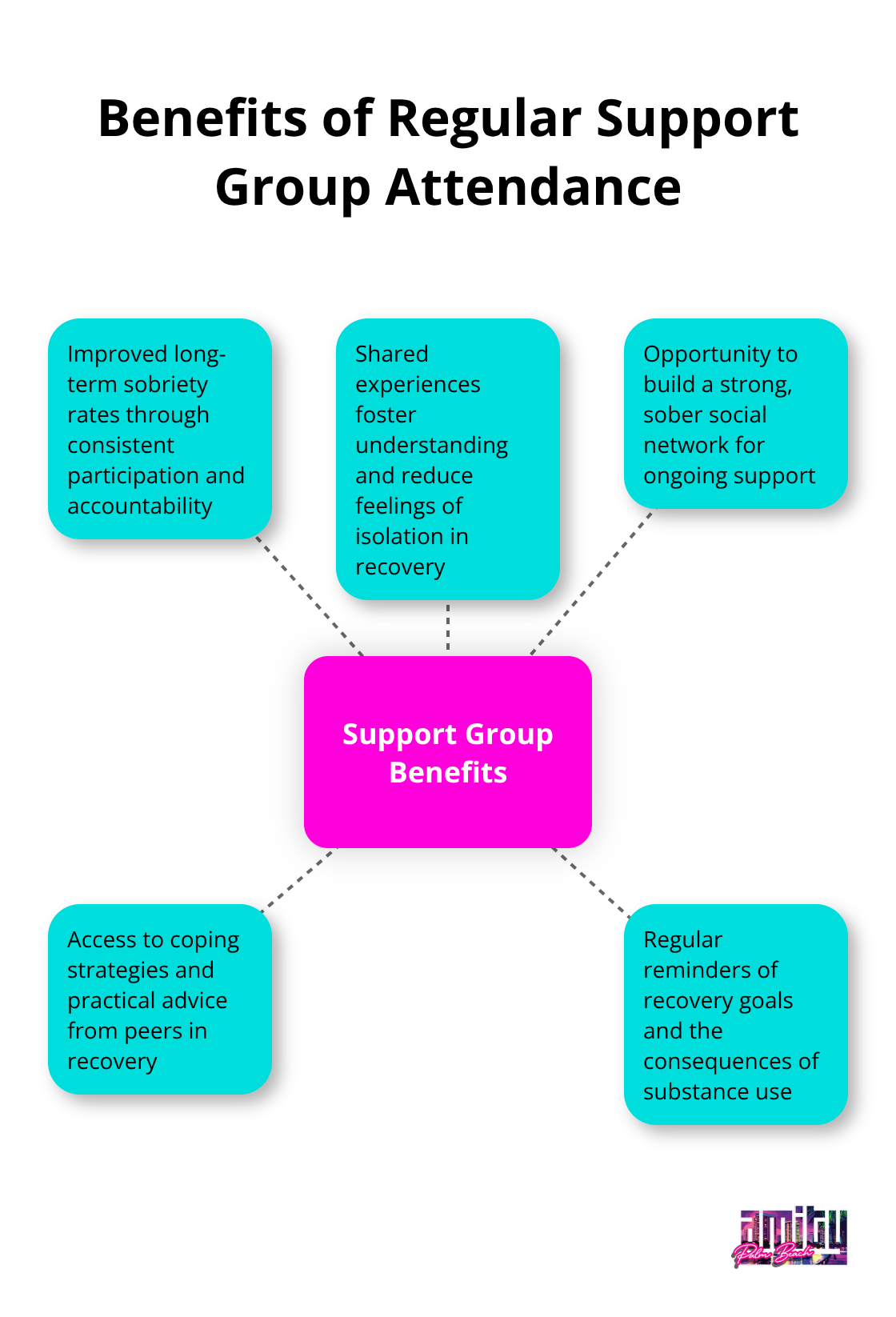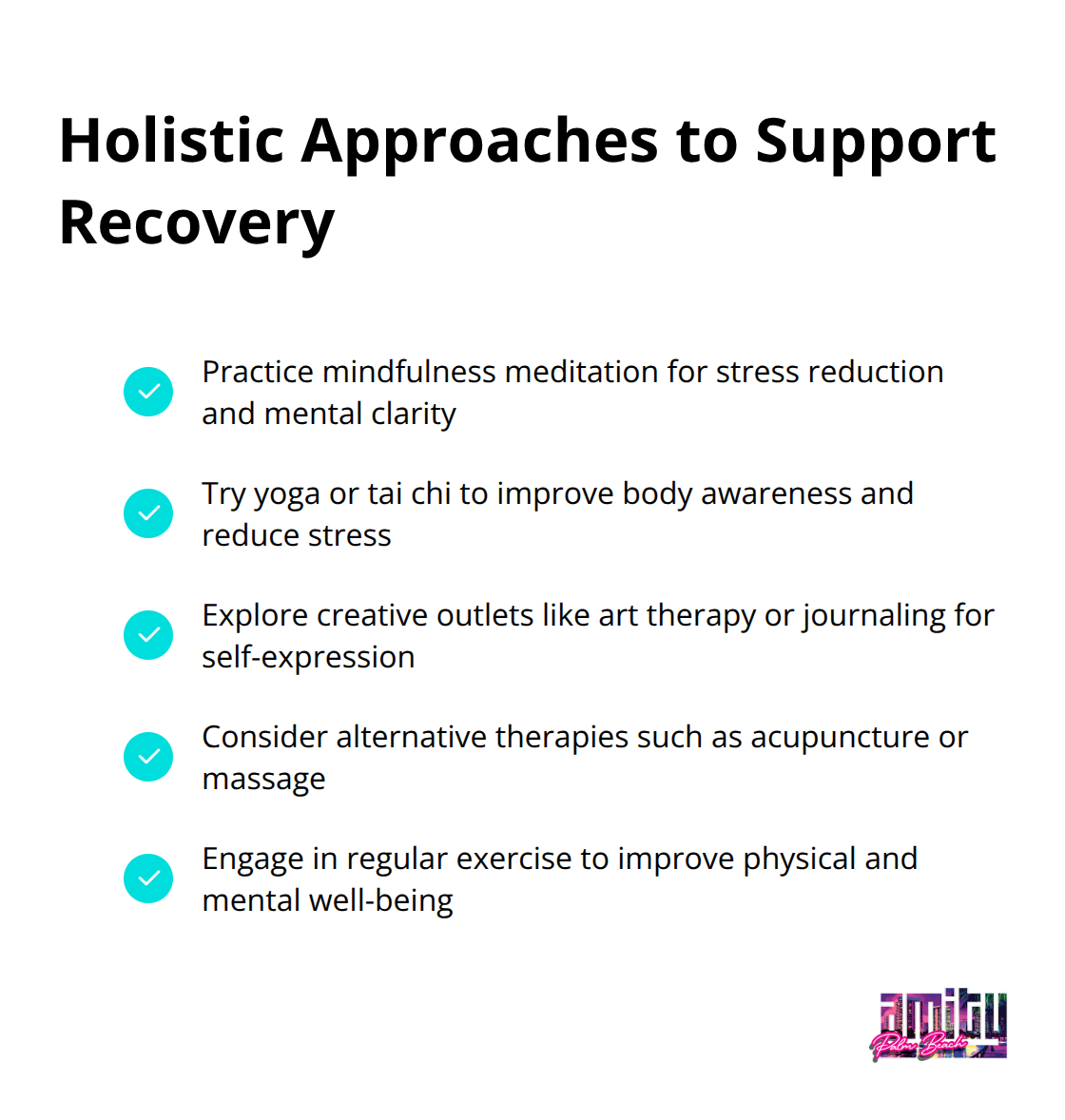At Amity Palm Beach, we understand that recovery is a journey with its share of challenges.
Relapse support is a critical component of long-term success in overcoming addiction. We believe that setbacks don’t define your progress; they’re opportunities for growth and learning.
This guide will help you navigate the path forward after a relapse, offering practical strategies and resources to strengthen your recovery journey.
Why Relapse Happens and How to Respond
Understanding Relapse as Part of Recovery
At Amity Palm Beach, we recognize that relapse is a common aspect of the recovery journey. Studies from the National Institute on Drug Abuse indicate that 40 to 60 percent of individuals in treatment for substance use disorders will relapse. This doesn’t signify failure – it presents an opportunity to learn and strengthen your resolve.

Identifying Personal Triggers
Recognizing your unique triggers is essential for preventing future setbacks. Common triggers include:
- Work or relationship stress
- Financial pressures
- Negative emotions (e.g., anger, loneliness)
- Exposure to people or places associated with past substance use
Start a journal to track your emotions and situations that evoke cravings. This self-awareness becomes your first line of defense against relapse.
Spotting Early Warning Signs
Relapse often begins well before substance use resumes. Watch for these early indicators:
- Isolation from your support network
- Missed therapy or support group meetings
- Idealization of past substance use
- Sudden changes in sleep or eating patterns
- Increased irritability or mood swings
Don’t wait for these signs to escalate – reach out for help at the first indication of trouble.
Taking Swift Action After a Setback
If you experience a relapse, quick action is vital. Follow these steps:
- Stop using immediately and move to a safe environment.
- Contact your sponsor, therapist, or a trusted support person.
- Attend a support group meeting as soon as possible.
- Schedule an appointment with your treatment provider to reassess your recovery plan.
Seeking help demonstrates strength and commitment to your recovery (not weakness). At Amity Palm Beach, we stand ready to support you through every phase of your journey, including bouncing back from setbacks.
Building a Stronger Recovery Plan
Use this experience to strengthen your recovery strategy. Consider these steps:
- Reassess your triggers and develop new coping mechanisms
- Increase your engagement with support groups or therapy sessions
- Explore additional <a href=”https://share.google/V3Fb6lqR1VEcZD9gZ”>addiction treatment</a> options (e.g., holistic therapies, medication-assisted treatment)
- Practice self-compassion and view this setback as a learning opportunity
Your ability to learn and adapt after a relapse often leads to a more robust, sustainable recovery. The next section will explore how to build and leverage a strong support network to prevent future relapses and maintain your progress.
How to Build Your Recovery Support Network
Reconnect with Treatment Professionals
If someone you love has relapsed, knowing how to respond can make a significant difference in their recovery journey. Reacting with anger or judgment is not helpful. Instead, your first action should be to contact your treatment team. Schedule an appointment with your therapist or counselor immediately. They will help you:
- Analyze the factors that led to the relapse
- Modify your treatment plan
- Provide strategies to cope with immediate challenges
Don’t hesitate to explore additional treatment options. Combining behavioral therapy with medication-assisted treatment often improves outcomes for many individuals.
Maximize Peer Support Groups
Peer support groups offer invaluable understanding and accountability. Regular attendance at support groups correlates with better long-term sobriety rates. Support groups help sustain long-term recovery through shared experience, accountability, and connection.

Find a group that resonates with you:
- Attend different meetings (both in-person and online)
- Search for specialized groups (e.g., for professionals, LGBTQ+, or specific substances)
- Consider becoming a sponsor when you’re ready – helping others reinforces your own recovery
Fortify Your Personal Support System
Your friends and family can become powerful allies in recovery. Here’s how to involve them effectively:
- Be honest about your setback and your commitment to recovery
- Educate them about addiction and recovery (share resources or invite them to open support meetings)
- Establish clear boundaries to protect your sobriety
- Request specific types of support (e.g., sober activities, check-in calls)
Quality matters more than quantity in your support network. A few deeply supportive relationships prove more valuable than a large network of casual acquaintances.
Utilize Professional Resources
At Amity Palm Beach, we offer a range of resources to support your recovery journey. Our team of experienced professionals (including therapists, counselors, and support staff) stands ready to guide you through challenges and setbacks.
We provide:
- Individual and group therapy sessions
- Holistic treatment approaches
- Aftercare planning and support
- Access to alumni networks and ongoing resources
Embrace Technology for Recovery
In today’s digital age, numerous apps and online tools can supplement your recovery efforts. These resources (available 24/7) can provide:
- Daily motivation and affirmations
- Tracking for sobriety milestones
- Immediate access to support networks
- Guided meditation and relaxation exercises
As you strengthen your support network, you’ll find that each component plays a vital role in your recovery journey. The next section will explore practical strategies to help you get back on track and maintain your progress after a setback.
Addiction treatment is an essential part of building a strong recovery support network.
How to Rebuild Your Recovery After a Setback
At Amity Palm Beach, we understand that getting back on track after a relapse requires a comprehensive approach. Here’s how you can rebuild your recovery and emerge stronger:
Reestablish Your Daily Routine
Structure plays a vital role in recovery. Create a daily schedule that includes:
- Consistent sleep patterns
- Balanced meals at set times
- Exercise
- Time for relaxation and self-care
Routine helps create stability, reduce anxiety, and establish healthy habits. It also provides structure and a sense of purpose in recovery.
Identify and Address Underlying Issues
Relapse often points to unresolved problems. Work with your therapist to:
- Explore triggers that led to your setback
- Create new coping strategies for stress and cravings
- Tackle any co-occurring mental health issues
Consider specialized therapies like Cognitive Behavioral Therapy (CBT) or Dialectical Behavior Therapy (DBT), which have shown effectiveness in preventing relapse.
Use Technology for Recovery Support
Smartphone apps provide 24/7 support and accountability. Some effective options include:
- Sober Grid: Connects you with a sober community and offers daily check-ins
- I Am Sober: Tracks your sober time and motivates with daily pledges
- Calm: Provides guided meditations and sleep stories to reduce stress
Engage in Holistic Healing Practices
Incorporate holistic approaches to support your recovery:

Holistic relapse prevention focuses on treating the entire person-mind, body, and spirit.
Strengthen Your Support Network
Reconnect with your support system:
- Attend more frequent support group meetings
- Schedule regular check-ins with your sponsor or mentor
- Be honest with trusted friends and family about your setback
- Consider family therapy to improve communication and understanding
At Amity Palm Beach, we offer a range of resources (including group therapy and family programs) to help you rebuild and strengthen your support network.
Final Thoughts
Recovery presents challenges, but setbacks offer opportunities for growth. We at Amity Palm Beach believe in the power of resilience to overcome obstacles and achieve lasting sobriety. Our team provides comprehensive relapse support, combining evidence-based treatments with holistic approaches to address individual needs.
Your journey to recovery doesn’t end with a setback. Each day brings a new chance to recommit to your sobriety and build the life you deserve. With the right tools and mindset, you can transform challenges into stepping stones toward lasting recovery.
We encourage you to reach out for relapse support whenever you need it (our team is always here to help). Your strength and determination are powerful allies in this journey, and we stand ready to support you every step of the way. Together, we can navigate the path to lasting recovery and a brighter future.




